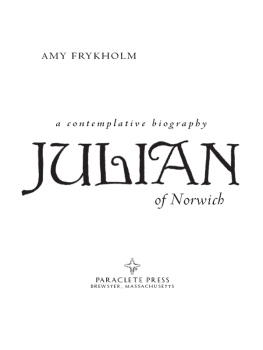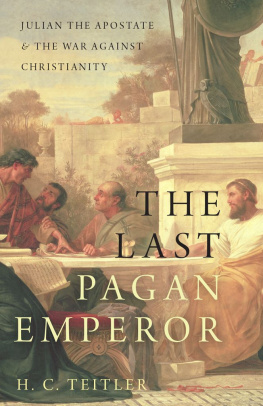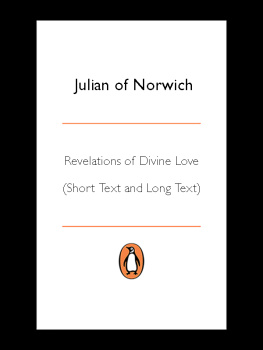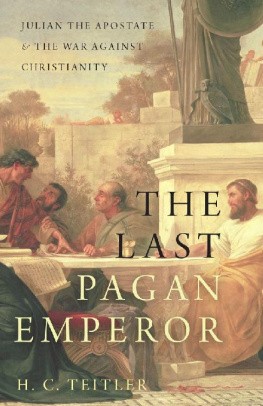JULIANS GODS
JULIANS GODS
Religion and philosophy in the thought and action of Julian the Apostate
Rowland Smith
First published 1995
by Routledge
11 New Fetter Lane, London EC4P 4EE
Simultaneously published in the USA and Canada
by Routledge
29 West 35th Street, New York, NY 10001
1995 Rowland Smith
All rights reserved. No part of this book may be reprinted or reproduced or utilized in any form or by any electronic, mechanical, or other means, now known or hereafter invented, including photocopying and recording, or in any information storage or retrieval system, without permission in writing from the publishers.
British Library Cataloguing in Publication Data
A catalogue record for this book is available from the British Library
Library of Congress Cataloguing in Publication Data
A catalogue record for this book has been requested
ISBN 0415034876
Prayers without sacrifice are only words, prayers with sacrifice are animated words.
Sallustius, On the gods and the universe
He did not feast some and ignore others, but made libation to all the gods whom the poets have passed down ancestral parents and their offspring, gods and goddesses, ruling and ruled and filled the altars of all of them with sheep and oxen.
Libanius, Oration XVII
How much more individual still was the character they assumed from being designated by names, names that were for themselves alone, proper names such as people have.
Proust, Du ct de chez Swann, trans. C.K. Scott Moncrieff
To Pandora
CONTENTS
Abbreviations
(Titles of periodicals are abbreviated according to the conventions of LAnne philologique.)
| ANRW | Aufstieg und Niedergang der rmischen Welt, I.1, ed. H. Temporini and W. Haase, Berlin/New York 1972 |
| Billerbeck, EVK | M. Billerbeck, Epictet Vom Kynismus, Philosophia Antiqua XXXIV, Leiden, 1978 |
| CCCA | Corpus Cultus Cybelae Attidisque, ed. M.J. Vermaseren, Leiden 197789 [=EPROER 5C] |
| CIMRM | Corpus Inscriptionum et Monumentorum Religionis Mithriacae, ed. M.J. Vermaseren, The Hague 1958 |
| CSEL | Corpus Scriptorum Ecclesiasticorum Latinorum |
| ELF | Iuliani Epistulae Leges Poematia Fragmenta Maria, ed. J. Bidez and F. Cumont, Paris 1922 |
| EPROER | tudes prliminaires aux rligions orientales dans lempire romain |
| Eunap. VS | Eunapius, Vitae Sophistarum, ed. J.F. Boissonade, Paris 1878, rev. W.C. Wright, Philostratus and Eunapius, Lives of the Sophists (Loeb Series), London, 1921: cited in the pagination of both Boissonade and Wright (=W), e.g. Eunap. VS 453/342W |
Journ. Mithr.
Stud.
Mitb. Stud. | Journal of Mithraic Studies
Mithraic Studies, III, ed. J. Hinnells,
Manchester 1975. |
| OC | Oracles Chaldaques, ed. E. des Places, Paris 1971 |
| PG | Patrologia Graeca |
| PGM | Papyri graecae magicae, ed. K. Preisendanz, Leipzig, 192941 |
| PLRE | A.H.M. Jones, J. Martindale and J. Morris, The Prosopography of the Later Roman Empire, III, Cambridge 197180 |
| RAC | Reallexikon fr Antike und Christentum |
| TMMM | F. Cumont, Textes et monuments relatifs aux Mystres de Mithra, III, Brussels 18967 |
Note on Citations from Julians Works
Source-references in the text and notes to Julians writings are cited by title of work only, omitting the author: eg. Or. 4.131a, Caes 306a.
The modern editions of Julian in the Loeb and Bud series use different systems to denote individual works. Citations here follow the Loeb in retaining the conventional numbering of the Orations:
Or. 1 = Panegyric in Honour of Constantius
Or. 2 = Panegyric on the Deeds of Constantius, or On Kingship
Or. 3 = Panegyric in Honour of the Empress Eusebia
Or. 4 = To King Helios
Or. 5 = To the Mother of the Gods
Or. 6 = Against the Uneducated Cynics
Or. 7 = Against Heraclius the Cynic
Or. 8 = Consolation to Himself on the Departure of Sallustius
The Ceasars (= Caes.), Misopogon, Letter to the Athenians (= Ep. ad SPQ Ath.), Letter to Themistius (= Ep. ad Them.), Letter to a Priest and the fragments of the Contra Galilaeos (= CG) are cited by title.
Citations of the above works normally follow Loeb text of W.C. Wright, with occasional departures signalled in the notes. For consistency and brevity, source-references in the main text to Letters of Julian are cited by a Loeb letter-number only, but J. Bidezs differently numbered edition of the letters (Vol. I.ii in the Bud) is here preferred as textually superior, and references in the notes add the Bud letter-number also, in brackets: eg. Ep. 1 (13 Bidez).
Preface
The reign of the Emperor Julian was brief, and it ended in dbcle. When he died in the summer of AD 363 he had ruled undisputed barely a year and a half, and the projected invasion of Persia in the course of which he met his death was to issue in a signally humiliating reverse for Rome in the East. Julians Persian campaign had been grandly conceived and prepared, but it was patently failing even before he was killed, and in the judgement of many the same was true of the best known of all his designs his attempt, fifty years after Constantines conversion to Christianity, at a pagan restoration in the cities of the Empire. On a common view, what Julian tried to do in this connection was unrealizable from the outset; on any view, the restoration and his other public purposes came to nothing.
None the less, very few antique figures have matched Julians enduring fascination in later eyes, and the case has not appealed solely as a study in imperial failure: Julians own personality and cultural mentality have held a powerful intrinsic attraction. In his lifetime, a large part of his reputation had rested on his fame as a daring and successful commander. On that score, it could not but suffer for the way the reign ended. But from the first there were other aspects to the man that made him an imperial rarity and attracted the interest of contemporaries. This Emperor was highly educated a learned man of discriminating literary taste, an avid student of Greek philosophy, and a writer of respectable talent in his own right. These were personal interests, but they were reflected too in the Emperors public style. Julian wore a philosophers beard, and responded to the Antiochenes ridicule of it with polished satire composed for public circulation; the civic inscriptions and oratory of politer subjects celebrated the rule of a lover of wisdom and letters. More than that: in Julians case, the cultured interests were closely bound up with a fervent religious sensibility which plainly impinged on central features of his public action. And the evolution of that sensibility had involved the repudiation of a Christian upbringing. Romes last pagan Emperor was also antiquitys most notable pagan convert, a nephew of Constantine educated as a Christian prince under the supervision of leading bishops of the day: Julian was to be remembered chiefly as the Apostate.









